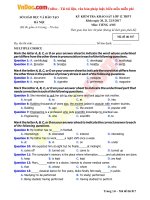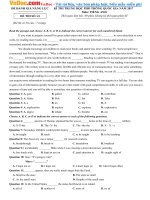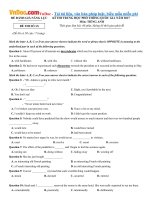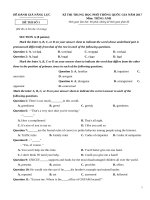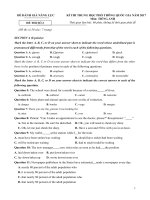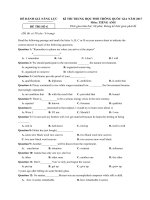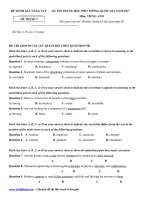Đề thi thử THPT Quốc gia năm 2017 môn Tiếng Anh có đáp án + giải thích chi tiết (Đề 4)
Bạn đang xem bản rút gọn của tài liệu. Xem và tải ngay bản đầy đủ của tài liệu tại đây (613.19 KB, 14 trang )
VnDoc - Tải tài liệu, văn bản pháp luật, biểu mẫu miễn phí
ĐỀ ĐÁNH GIÁ NĂNG LỰC
KÌ THI TRUNG HỌC PHỔ THÔNG QUỐC GIA NĂM 2017
Môn: TIẾNG ANH
Thời gian làm bài: 60 phút, không kể thời gian phát đề
ĐỀ THI SỐ 4
(Đề thi có 50 câu / 6 trang)
Mark the letter A, B, C, or D on to indicate the correct answer to each of the following questions.
Question 1:________ every major judo title, Mark retired from international competition.
A. When he won
B. Having won
C. Winning
D. On winning
Question 2: The opposition will be elected into government at the next election, without a
A. shade
B. shadow
C. benefit
________ of a doubt
D. hue
Question 3:_________ her fiction describes women in unhappy marriages.
A. Many of
B. A large number of
C. A great volume of
D. Much of
Question 4: It seems that the world record for this event is almost impossible to_______ .
A. get
B. beat
C. take
D. achieve
Question 5: The smell was so bad that it completely_________ us off our food.
A. set
B. took
C. got
D. put
Question 6: He has been waiting for this letter for days, and at________ it has come.
A. last
B. the end
C. present
D. the moment
Question 7: It is______opportunity to see African wildlife in its natural environment.
A. an unique
B. a unique
C. the unique
D. unique
Question 8: " Why don’t we ask Martin to chair the meeting?”
"Well, suppose____________to ask him, do you think he would accept?”
A. were we
B. we have
C. we try
D. we were
Question 9: Delegates will meet with_________ from industry and the government.
A. Represented
B. representative
C. representatives
D. representers
Question 10: Determining the mineral content of soil samples is an exacting process; ________ experts must perform
detail tests to analyze soil specimens.
A. so that
B. However
C. afterwards
D. therefore
Question 11: Peter: “Is it important?”
Thomas: “________”
A. Not on your life!
B. It’s a matter of life and death!
C. No worry, that’s nothing.
D. It’s ridiculous.
Question 12: Ann. “Does the global warming worry you?
Mathew. “________”.
A. What a shame!
B. Oh, it’s hotter and hotter
C. I can’t bear to think about it.
D. I don’t like hot weather, in the garden all day.
Question 13: You look exhausted. You ________ in the garden all day.
A. must have worked
B. must be working
1
C. can’t have worked
D. must have been working
Question 14: I’ve never really enjoyed going to the ballet or the opera; they’re not really my________.
A. piece of cake
B. sweets and candy
C. biscuit
D. cup of tea
Mark the letter A, B, C, or D on your answer sheet to indicate the word whose underlined part that differs from the
other three in the pronunciation in each of the following questions.
Question 15: A. spear
B. gear
C. fear
D. pear
Question 16: A. sword
B. sweet
C. swear
D. swing
Mark the letter A, B, C, or Dto show the underlined part that needs correction in each of the following questions.
Question 17: The composer Verdi has written the opera Aiđa to celebrate the opening the Suez Canal,
A
B
C
but the opera was not performed until 1871.
D
Question 18: Wealthy people have always desired and wear precious stones because their beauty
A
B
C
is lasting.
D
Question 19: Every city in the United States has traffic problems because the amount of cars
A
B
C
on American streets and highways is increasing every year.
D
Mark the letter A, B, C, or D to indicate the word or phrase that is OPPOSITE in meaning to the underlined part in
each of the following questions.
Question 20: His physical condition was not an impediment to his career as a violinist
A. hindrance
B. obstruction
C. furtherance
D. setback
Question 21: The ship went down although strenuous efforts were made to save it.
A. exhausting
B. forceful
C. energetic
D. half-hearted
Read the following passage and mark the letter A, B, C, or D to indicate the correct word(s) for each of the following
blanks.
It can take along time to become successful in your chosen field, however talented you are One thing you have to be
(22) _________ of
is that you will face criticism along the way. The world is full of people who would rather say
something negative than positive. If you’ve made up your mind to achieve a certain goal, such as writing a novel don’t let
the negative criticism of others prevent you from reaching your purpose and let constructive criticism have a positive (23)
_________ on your work. If someone says you’re totally lacking talent ignore them. That’s negative criticism. If, however,
someone advises you to revise your work and gives you good reasons for doing so, you should (24) _________ their
suggestions carefully. There are many film stars who were once out of
(25) _________ .Therearemanyfamous novelists who made a complete mess of their first novel - or who didn’t, but had to
keep on approaching hundreds of publishers before they could get it published. Being successful does depend on luck, to
a certain extent. But things are more likely to (26) _________ well if you persevere an s ay
Question 22: A. kept in mind
B. clever
C. intelligent
D. aware
Question 23: A. affect
B. effect
C. result
D. change
2
VnDoc - Tải tài liệu, văn bản pháp luật, biểu mẫu miễn phí
Question 24: A. cautious
B. consider
C. reckon
D. remember
Question 25: A. career
B. business
C. job
D. work
Mark the letter A, B, C, or D to indicate the word that differs from the rest in the position of the main stress in
each of the following questions.
Question 27: A. mutually
B. apologize
C. permission
D. reaction
Question 28: A! survival
B. industty
C. endangered
D. commercial
Mark the letter A, B, C, or D to indicate the word or phrase that is CLOSEST in meaning to the underlined pan in each of
the following questions.
Question 29: She is always diplomatic when she deals with angry students.
A. strict
B. outspoken
C. tactful
D. firm
Question 30: Nobel's original legacy of nine million dollars was invested, and the interest on this sum is used for the
awards which vary from $30, 000 to $125, 000.
A. fortune
B. prize
C. heritage
D. bequest
Read the following passage and mark the letter A, B, C or D to indicate the correct answer to each of the following
questions.
Of all modern instruments, the violin is apparently one of the simplest. It consist in essence of a hollow, varnished
wooden sound box, or resonator, and a long neck covered with a fingerboard, along which four strings are stretched at
high tension. The beauty of design, shape, and decoration is no accident, the proportions of the instrument are determined
entirely by acoustical considerations. Its simplicity of appearance is deceptive. About 70 parts are involved in the
construction of a violin. Its tone and its outstanding range of expressiveness make it an ideal solo instrument. No less
important, however, is its role as an orchestral and chamber instrument In I combination with the larger and
deeper-sounding members of the same family, the violins form the nucleus of the modem symphony orchestra.
The violin has been in existence since about 1550. Its importance as an instrument in its own right dates from the early
1600’s, when it first became standard in Italian opera orchestras. Its stature as an orchestral instrument was raised further
when in 1626 Louis XIII of France established at his court the orchestra known as Les vinq-quatre violons du Roy (The
King's 24 Violins), which was to become widely famous later in the century.
In its early history, the violin had a dull and rather quiet tone resulting from the fact that the strings were thick and
were attached to the body of the instrument very loosely. During the eighteenth and nineteenth century exciting technical
changes were inspired by such composer-violinists as Vivaldi and Tartini. Theừ instrumental compositions demanded a
fuller, clearer, and more brilliant tone that was produced by using thinner strings and a far higher string tension. Small
changes had to be made to the violin's internal structure and to the fingerboard so that they could withstand the extra strain.
Accordingly, a higher standard of performance was achieved, in terms of both facility and interpretation. Left-hand
technique was considerably elaborated, and new fingering patterns on the fingerboard were developed for very high notes.
Question 31: The word "standard" is closest in meaning to______________ .
A. practical
B. customary
C. possible
D. unusual
Question 32: "The King’s 24 Violins" is mentioned to illustrate_____________ .
A. the competition in the 1600's between French and Italian orchestras
B. how the violin became a renowned instrument
C. the superiority of French violins
3
D. why the violin was considered the only instrument suitable to be played by royalty
Question 33: What is the main idea presented in paragraph 3?
A. The violin is probably the best known and most widely distributed musical instrument in the world.
B. The violin has been modified to fit its evolving musical functions.
C. The violin had reached the height of its popularity by the middle of the eighteenth century.
D. The technique of playing the violin has remained essentially the same since the 1600's.
Question 34: The word "they" in paragraph 3 refers to__________ .
A. Civaldi and Tartini
B. internal structure and fingerboard
C. thinner strings and a higher string tension
D. small changes
Question 35: According to the passage, early violins were different from modem violins in that early violins
A. were heavier
B. produced softer tones
C. were easier to play
D. broke down more easily
Question 36: According to the passage, which of the following contributes to a dull sound being produced by a violin?
A. A long fingerboard
B. A small body
C. High string tension
D. Thick strings
Question 37: All of the following are mentioned in the passage as contributing to the ability to play modern violin music
EXCEPT_________________.
A. use of rare wood for the fingerboard and neck
B. different ways to use the fingers to play very high notes
C. more complicated techniques for the left hand
D. minor alterations to the structure of the instrument
Read the following passage and mark the letter A, B, C, or D to indicate the correct word(s) for each of the following
blanks.
Pollutants are clogging up the atmosphere above our planet and trapping the sun's heat. That makes our planet warmer,
which causes glaciers to melt, crazy weather patterns to develop, and natural disasters spread like wildfires.
But there are other consequences that people don't always associate with climate change. One surprising fact about
global warming is that it makes people more aggressive.
As the world gets hotter, tempers also get fierier. A new study found that violent crimes and even war become more
likely as temperatures rise. Heart rates tend to be elevated in warm weather, so people are prepped for a physical response
to a situation. That’s not to say we're headed for a violent end as Earth warms up, though. Advances in everything from
technology to health have sparked a decline in conflict. It's just that global warming might be slowing that decline.
Question 38: What is trapping the sun’s heat?
A. The atmosphere
B. Pollutant
C. Glaciers
D. The atmosphere above our planet
Question 39: According to the paragraph 1, all of the following are results of our planet getting warmer EXCEPT
A. Melting glaciers
B. Increasing greenhouse gas
C. Natural disasters like wildfires
D. Crazy weather patterns to develop
Question 40: One surprising fact about global warming surprising fact about global warming is that
A. it could sink cities
B. it makes people more aggressive
C. it makes mountains taller
D. It will last for centuries
Question 41: What does the new study found about the causes of rising temperatures?
4
VnDoc - Tải tài liệu, văn bản pháp luật, biểu mẫu miễn phí
A. People becomes more healthy
B. Plants bloom earlier in the winter
C. Violent crimes are likely to happen
D. Sea level rises
Question 42: Why are people prepped for a physical response to a situation?
A. Because heart rates tend to be elevated in warm weather
B. Because there are a lot of surprising facts
C. Because their hearts are weaker due to the rising temperatures
D. Because they are more aggressive now
Question 43: The author uses the phrase “headed for” to mean
A. To change
B. To experience something soon
C. To go for
D. To be good at
Question 44: The word “elevated” is closest in meaning to
A. dropped
B. grew
C. enlarged
D. raised
Question 45: What is the topic of the passage?
A. A global warming surprising fact
B. Aggressive modem people
C. The bad effects of global warming
D. A study on global warming
Mark the letter A, B, C, or D to indicate the sentence (hat best combines each pair of sentences in the following
questions.
Question 46: We cut down many forests. The Earth becomes hot.
A. The moreforests we cut down, thehotter the Earth becomes.
B.
The morewe cut down forests, thehotter the Earth becomes,
C. The moreforests we cut down, the Earth becomes hotter.
D. The morewe cut down forests, the Earth becomes hotter.
Question 47: The new restaurant looks good. However, it seems to have few costumers.
A. In spite of its appearance, the new restaurant does not appear to attract much business.
B. The new restaurant would have more customers if it looked better.
C. In order to get more business, the new restaurant should improve its appearance.
D. If it had a few more customers, the new restaurant would look better.
Mark the letter A, B, C, or D on your answer sheet to choose the sentence which is closest in meaning to the given one.
Question 48: Please arrive early because we want to be able to start our meeting early
A. Please arrive early so that we can start our meeting early.
B.
Please arrive early so that we are able to start our meeting early
C. Please arrive early so that we would be able to start our meeting early
D. Please arrive early for us to be able to start our meeting early
Question 49: There was no need for you to have left the house in such weather.
A. You needn’t leave the house in such weather.
B. You needn’t have left the house in such weather.
C. You didn’t have to leave the house in such weather.
D. You didn’t need to leave the house in such weather.
Question 50: The concert went like a bomb.
5
A. The concert was a disaster
B. There was a bomb in the concert
C. The concert was very violent
D. The concert was extremely successful.
6
1B
2B
3D
11B
12C
13D
21D
22D
31B
41C
4B
5D
6A
7C
9C
10D
VnDoc
- Tải
tài liệu,
văn
bản 8D
pháp luật,
biểu
mẫu miễn phí
14D
15D
16A
17A
18B
19C
20C
23B
24B
25D
26C
27A
28B
29C
30D
32B
33B
34B
35B
36D
37A
3SB
39B
40B
42A
43B
44D
45A
46A
47A
48A
49B
50D
ĐÁP ÁN
GIẢI THÍCH
CHI HẾT
Question 1: Chọn B
Tạm dịch: Mark nghi không tham gia các trận
gì, không tin tưởng ai
đẩu quốc tể sau khi đã đạt giành được nhiều
Eg: Don't be put off by its appearance - It tastes
danh hiệu lởn về judo.
delicious!
Khi có hai hành động ngắn, hành động này
xảy ra ngay sau hành động kia, chúng ta có
Eg: We are going to set off at 5 o'clock so don't
thể dùng dạng a-ing” đễ mô tả hành động đầu
stay up late.
tiên.
Asking for direction, he drove to her house.
(máy bay) cất cánh
Nếu một trong hai hành động xảy ra lâu, chúng
Eg: The plane takes off at 12: 30.
ta phải sử dụng thì hoàn thành.
Eg: Having prepared the breakfast for the
Eg: We'll get off after lunch.
whole family, my mother went to work.
Question 6: Chọn A
→ Having + pp, S + V(2)
Question 2: Chọn B
Eg: At last, we got home.
Cụm cố định a shadow of a doubt: sự nghi ngờ
Cấu trúc beyond the shadow of a doubt; không
Eg: He applied for different positions and in the
hề nghi ngờ
end work as an assisstant.
A large number of +(n) + V (plural)
Many/Much of + determiner (chỉ định từ)
+ (n)
To put sb off (phrv): làm ai không thích cái
To set off (phrv): khởi hành
To take off (phrv): (sự nghiệp) phát triển,
To get off (phrv): khởi hành
At (long) last = finally
In the end: cuối cùng
At present at the moment = now
Eg: She's out at present! Can you leave a
message?
Question 7: Chọn C
Question 3: Chọn D
It is the unique opportunity/ chance for sb
Eg: You can't see much of a country in a week.
to do st: Đây là cơ hội đặc biệt cho ai làm gì
Ở đây fiction là danh từ không đếm được nên
(nhấn mạnh đến sự xác định cùa cơ hội này)
phải dùng much.
Question 8: Chọn D
Để ý thấy động từ trong câu này được chia ở
Cấu trúc đi với suppose giống như cấu trúc câu
ngôi thứ ba số ít
điều kiện loại 2.
A great volume of poetry.- nhiều sách văn
Question 9: Chọn C
học.
Represent (v): đại diện cho
Question 4: Chọn B
Representative (a): linh đại diện
Representatives (n): người đại diện
To beat the record:phớ vỡ kỷ lục (-break
the record)
Representer: người trình bày
Question 5: Chọn D
Vậy chọn đáp án C: Representatives (n): người
7
đại điện (phù hợp với deligates - phái đoàn)
mạnh đến chính hành động.
Tạm dịch: Phái đoàn sẽ gặp gỡ đại diện ngành
Eg: He sweated a lot He must have run here to
công nghiệp và chính phủ.
catch up with you.
Question 10: Chọn D
Can’t have + V(pII). chắc chắn việc gì đã
Tạm dịch: Xác định lượng chất khoáng trong
không xảy ra trong quá khứ.
đất là quá trình đòi hỏi sự chính xác; vì vậy, các
Eg: He can't have been at the scene, he was at
chuyên gia phải tiến hành kiểm tra chi tiết
my house last night
những mẫu đất.
Question 14: Chọn D
So that: cốt để
A piece of cake: chuyện dễ đàng.
Eg: She didnjt lock the door so that he could get
Eg: Learning poems by heart is a piece of
into the house.
cake to me.
However (adv): tuy nhiên.
A cup of tea: sở thích.
Eg: He was ill. He still went to school, and sat
Eg: Classical music is not my cup of tea.
the exam.
Question 15: Chọn D
Afterwards (adv): sau đổ.
Spear/ spiə / (n) (cái giáo, cái mác, cái
Eg: Afterwards she felt guilty about what she
had done.
thương)
Gear/ giə/ (n) (cơ cấu, thiết bị, dụng cụ; đồ
Question 11: Chọn B
Tạm dịch: Peter: chuyện đó có quan trọng
gá lắp, phụ tùng)
không?
Fear/ fiə/ (n) (sự sợ, sự sợ hãi)
Thomas: Đó là vấn đề sổng còn đấy!
Pear/ peə / (n) (quả lê)
Question 12: Chọn C
Tạm dịch: Ann: Việc Trái Đất nóng lên có làm
bạn lo lắng không? Mathew: Tôi không thể suy
nghĩ về vẩn đề đó.
Đáp án chính xác là D vì phần gạch chân được
đọc là âm /eo/ khác với những đáp án còn lại
đọc âm /eə/.
Can't bear to do st can't accept and deal with
Question 16: Chọn A
St unpleasant: không thể chịu đựng được phải
Sword/ sɔ:d / (n) (gươm, kiếm)
làm gì
Sweet/ swɪ:t / (adj) (ngọt, thơm)
Eg: She can’t bear to be slandered.
Question 13: Chọn D
,
Swear/ sweə / (v) (lời nguyên rùa, câu chửi
Must have + been + V_ing. ắt hẳn đã, chỉ
rua, lời thề)'
một phán đoán có tính lập luận, chắc chắn, nhan
Swing/ swɪn / (v, n) đu đưa, lúc lăc (v); sự
mạnh đền tính kẻo dài của hành động.
đu đưa, sự lúc lắc; độ đu đưa, độ lắc, cái đu)
Eg: He have a sore throat after a 5-hour lecture.
Đáp án chính xác là A vì phần gạch chân được
He must have been talking a lot.
đọc là âm /s/ khác với những đáp án còn lại đọc
Must have + V(pII). ắt hẳn đã, chỉ một
âm /sw/.
phán đoán có tính lập luận, chắc chắn, nhấn
8
VnDoc - Tải tài liệu, văn bản pháp luật, biểu
mẫu miễn phí
Question 17: Chọn A
Eg: Even though some smokers are well aware
Đổi has written thảnh wrote
of the bad effects of smoking, they don't give it
Ở đây chì 1 hành động đã xảy ra vào thời điểm
up.
xác định trong quá khứ.
To keep St in mind: nhớ.
Question 18: Chọn B
Eg: Please keep in mind that you're here to
Đổi Wealthy people have always desired and
work, not to gossip around.
wear thành Wealthy people have always
Question 23: Chọn B
desired and worn
To have a positive effect on st: có ảnh hưởng
Cấu trúc song song: phía trước là thì hiện tại
tích cực đến cái gì.
hoàn thành thì động từ sau “and” cũng phải đảm
Eg: His encouragement has a positive effect on
bảo đúng theo thì này.
her spirit.
Question 19: Chọn C
To affect st: ảnh hưởng đến.
Đổi the amount of cars thành the number of cars
Eg: Exhaust fumes badly affect the
Car là danh từ đếm được không dùng the
environment
amount
Question 24: Chọn B
Question 20: Chọn C
To consider one’s suggestion: cân nhắc đề
Impediment (n) (trờ ngại) = obstacle ><
nghị cùa ai.
furtherance (n) (sự tiến bộ) = advancement
Eg: You should consider his suggestion. I think
Eg: He took the actions in the furtherance of his
it's an interesting idea.
career.
Be cautious about st; cẩn thận.
Hindrance (n) (trở ngại)
Eg: You should be cautious about talking to
Eg: We were allowed to travel around the
him.
country without hindrance.
To reckon (informal) = think: nghĩ.
Obstruction (n) (sự ngáng đường)
Eg: I reckon that I'm going to get that job.
Eg: The abandoned car caused an obstruction.
Question 25: Chọn D
Setback (n) (vấn đề, khó khăn)
Be out of work = be unemployed: that
Eg: The rumor of his corruption was a serious
nghiệp.
setback, to his career.
Eg: Due to the inflation, many people are out
Question 21: Chọn D
of work
Strenuous (a) (tích cực) >< half-hearted (a):
Question 26: Chọn C
(nửa vời, không nỗ lực hết mình)
To turn out: hỏa ra, trử thành.
Eg: He made strenuous efforts to pass the
Eg: He turned out to be the owner of the
entrance university exam.
restaurant.
Forceful = assertive (a) (quyết tâm)
To carry out St.- tiên hành.
Eg: a forceful personality
Eg: to carry out a research/an experiment
Question 22: Chọn D
To bring out St: làm cái gì xuât hiện.
Be aware of st: biết, nhận thức được.
Eg: The crisis brings out the best in her.
^
^
9
Question 27: Chọn A
Heritage (n): di sản.
Nhấn trọng âm ờ âm tiết thứ 1, còn lại nhẩn âm
Eg: The country has a long and proud heritage.
thứ 2.
Question 31: Chọn B
Mutually (adv) (ìan nhau, qua lại)
Standard (a) (tiêu chuẩn, thông thườììg)
Apologize (v) (xin lỗi, lạ lỗi)
Practical (a) (thiết thực)
Permission (n) (sự cho phép)
Customary (a) (thông thường)
Reaction (n) (sự phản tác dụng, sự phản ứng
Possible (a) (hợp lí, có thể thực hiện được)
lại)
Unusual (a) (khác thường)
Question 28: Chọn B
Như vậy có đáp án B gần nghĩa nhất.
Đáp án B Nhấn trọng âm ờ âm tiểt thứ 1, còn lại
Question 32: Chọn B
nhấn âm thứ 2
Keywords: The King’s 24 Violins
Survival (n) (sự sốngsót, người còn lại; vật
Clue: “Its stature as an orchestral instrument
sót lại (của một thời kỳ đã qua); tàn ác, tàn tích)
was raised further when in 1626 Louis XIII of
Industry (n) (công nghiệp)
France established at his court the orchestra
Endangered (ađj) (bị nguy hiểm)
known as Les vinq-quatre violons du Roy (The
Commercial (adj) ((thuộc) buôn bán; (thuộc)
King's 24 Violins), which was to become
thương mại; (thuộc) thương nghiệp)
widely famous later in the century. Tầm cỡ của
Question 29: Chọn C
nó với vị trí là một nhạc cụ cho dàn nhạc được
Diplomatic (a) = tactful (a) khéo lẻo (cưxử).
nâng cao hơn vào năm 1626 khi vua Louis XIII
Eg: a diplomatic answer
cùa nước Pháp thành lập một dàn nhạc tại cung
Strict (a) (nghiêm khắc).
điện của mình gọi là Les vinq-quatre vìoỉons du
Eg: a strict teacher
Roy, mà về sau trở nên nổi tiếng rộng rãi. Như
Firm (a) (chắc chan).
vậy The King’s 24 Violins được đề cập mục
Eg: a firm believer in communism
đích để minh họa cho việc violion trờ thành một
Outspoken (a) (mình bạch, rõ ràng, nói
nhạc cụ nổi tiếng như thể nào. Như vậy đáp án
thăng điều mình nghĩ dù điểu đó có thê khiến
đúng phải là B.
người khác phiền lòng)
Question 33: Chọn B
Eg: An outspoken opponent of the leader,
Keywords: main idea, paragraph 3
spoken comments.
Đoạn văn nói về quá trình thay đổi cùa violin.
Question 30: Chọn D
Những từ để nhận biết: “In its early history”,
Legacy (n) = bequest (n) = inheritance (n)
“During the eighteenth and nineteenth century”,
phần tài sản để lại cho ai sau khi người đó chết
“Small changes”...
Fortune (n) (kho báu, vật có nhiều giá trị).
Ta chọn đáp án B. The violin has been modified
Eg: The car costs me a fortune (cost me a lot of
to fit its evolving musical functions.: Violin đã
money).
được sửa đổi để phù hợp với chức năng âm
Prize (n) (giải thưởng).
nhạc ngày càng phát triển cùa nó.
Eg: Nancy was awarded the prize.
Question 34: Chọn B
10
VnDoc - Tải tài liệu, văn bản pháp luật, biểu
mẫu miễn phí
Keywords: they, paragraph 3
C: Glaciers: Sông băng
Clue: “Small changes had to be made to the
D: The atmosphere above our planet: Không khí
violin's internal structure and to the fingerboard
trên hành tinh chúng ta
so that they” (Cần thực hiện vài thay đổi nhỏ tới
Question 39: Chọn B
cẩu trúc bên trong và bàn phím cùa violin để
Key words: paragraph 1, our planet, warmer,
chúng...)
EXCEPT
Question 35: Chọn B
Clue: “That makes our planet warmer, which
Clue: “In its early history, the violin had a dull
causes glaciers to melt, crazy weather patterns
and rather quiet tone resulting from the fact that
to develop, and natural disasters spread like
the strings were thick”: Trong lịch sử ban đầu
wildfires”: Điều này khiến hành tinh của chúng
cùa nó, violin có một giai điệu buồn tẻ và khá
ta ấm lên, khiến sông băng tan chảy, thời tiết
yên tĩnh, bởi thực tế dây đàn rất mỏng.
thay đổi, và các thảm họa thiên nhiên xảy ra
Đây chính là điểm khác biệt giữa violin ban đầu
liên tiếp.
và violin hiện đại. Violin ban đầu cho ra những
Ta thấy các đáp án A, C, và D đều xuất hiện
giai điệu êm và dịu hơn. Đáp án đúng phải là B.
trong Clue. Đáp án B. Increasing greenhouse
Question 36: Chọn D
gas: khí nhà kính tăng không xuất hiện trong
Question 37: Chọn A
bài.
Clue:
Question 40: Chọn B
+ “Small changes had to be made to the violin's
Key words: surprising fact, global warming
internal structure...” - Đáp án D
Clue: “One surprising fact about global
+ “Left-hand technique was considerably
warming is that it makes people more
elaborated, and new fingering patterns on the
aggressive”: Một sự thực thú vị về nóng lên
fingerboard were developed for very high
toàn cầu là nó làm con người nóng
notes. ” — Đáp án B, C.
nảy hơn.
Như vậy đáp án đúng phải là A.
Các đáp án khác không xuất hiện trong bài.
Question 38: Chọn B
A: It could sink cities: nó có thể làm chìm các
Key words: trapping the sun’s heat
thành phổ
Clue: “Pollutants are clogging up (bít kín, lấp
C: It makes mountains taller: nó làm các dãy
đầy; syn. fill) the atmosphere above our planet
núi cao hơn
and trapping the sun's heat”: Các chất ô nhiễm
D: It will last for centuries: nó sẽ kéo dài hàng
đang lắp đầy không khí trên hành tinh chúng ta
thế kỷ
và tích tụ nhiệt lượng của mặt trời.
Question 41: Chọn C
Vì “trapping the sun's heat” là vị ngữ của câu
Key words: new study found, rising
nên chủ ngữ của câu chính là đáp án cần tìm. Do
temperatures
đó chọn B. Pollutants
Phân tích: Thông tin xuất hiện trong đoạn 3 về
Các đáp án khác không phù hợp.
kết quả của cuộc nghiên cứu. Đáp án C là đáp
A: The atmosphere: Không khí
án đúng vì ‘Violent crimes” là đáp án duy nhất
11
xuất hiện trong bài. Các đáp án khác không có
for something. Tránh hiểu nhầm “to have a
thông tin.
good head for” và “head for”
Question 42: Chọn A
Question 44: Chọn D
Key words: prepped for, physical response
Keywords: elevated
Clue: “Heart rates tend to be elevated in warm
Clue: “Heart rates tend to be elevated in warm
weather, so people are prepped for a physical
weather, so people are prepped for a physical
response to a situation”: Nhịp tim có xu hướng
response to a situation”: Nhịp tìm có xu hướng
nhanh hơn khi thời tiết ẩm, vì vậy mọi người
nhanh hơn khi thời tiết ấm, vỉ vậy mọi người
phải chuân bị để cơ thể thích nghi với tình
phải chitân bị đẻ cơ thế thích nghi với tình
huống.
hnổng.
Phân tích:
Phân tích: Xét các đáp án khi đặt vào ngữ cành
A: Because heart rates tend to be elevated in
Dropped: nhịp tim giảm mạnh: Như vậy
warm weather - Đúng, trùng với thông tin Clue.
không đẫn đến bạo lực - Sai
B: Because there are a lot of surprising facts: Vì
Grew: nhịp tim phát triển - Không có ý
có rẩt nhiều sự thật thú vị - Sai.
nghĩa
C: Because their hearts are weaker due to the
Enlarged: nhịp tim mở rộng - Không có ý
rising temperatures: Vì tim của họ yếu hơn khi
nghĩa,
nhiệt độ tăng - Sai, tim đập nhanh hơn khiến
người ta dể nóng giận không phải tim yếu đi
Question 45: Chọn A
D: Bccause they are more aggressive now: Vì
Keywords: topic
ngày nay họ nóng nảy hơn - Không có thông tin
Clue: “Green roofs also save money by
Question 43: Chọn B
lowering the cost of interior heating and cooling.
Key words: headed for
One study found that an average building with a
Clue: “That’s not to say we're headed for a
green roof requires 25 percent less cooling in
violent end as Earth warms up”: Điều này
commercial facility”: Mái xanh tiết kiệm tiền
không phải ý nói chúng ta sắp phải đối đầu với
bằng cách giảm chi phí nội thất sưởi ấm và làm
cái kết bạo lực khi Trái Đất nóng lên.
lạnh trong nhà. Một nghiên cứu chi ra rằng một
Phân tích: “headed for” là một thành ngữ, có
tòa nhà tầm trung sử dụng mái xanh cần ít hơn
nghĩa là chuẩn bị cho một điều gì sắp xảy ra do
25% làm mát tại công ty...
hành động hay hành vi cùa bản thân minh. Chọn
Phân tích: Đoạn văn đề cập chính đến một sự
đáp án B. To expcricncc something soon.
thật thú vị về nóng lên toàn cầu. Thông qua ý
Các đáp án còn lại không phù hợp khi ghép vào
của bài và các từ khóa, topic cả bài là A. A
văn cảnh Clue:
global warming surprising fact.
To change: thay đổi cái kết bạo lực
Xét các đáp án khác:
To go for: ủng hộ cái kết bạo lực
B: Aggressive modem people: Người hiện đại
To be good at: giỏi cái kết bạo lực
nóng nảy - Chủ đề quá hẹp.
To be good at something = to have a good head
C: The bad effects of global warming - Chù đề
Raised: nhịp tim tăng nhanh Hợp lý
12
VnDoc - Tải tài liệu, văn bản pháp luật, biểu
mẫu miễn phí
quá rộng
Clause, Clause
D: Study on global warming - Chủ đề quá hẹp
Question 48: Chọn A
Question 46: Chọn A
Sau mệnh đề “so that” ta dùng một sổ động từ
Cẩu trúc so sánh cấp tiến:
khuyết thiếu (can/could/will/would...) phù hợp
The + comparative + S + V, the comparative +
với thì ngữ pháp và ý nghĩa để thể hiện rõ ý chỉ
S+V
mục đích. Đáp án A thích hợp nhất.
Eg: The harder you try, the better your result is.
Tạm dịch: hãy đến sớm để chúng ta có thể bắt
→ Loại C và D
đầu cuộc họp sớm.
Many + N chuyển thành more + N (So sánh hơn)
Question 49: Chọn B
Vậy chọn đáp án A
There’s no need for somebody to do something:
Tạm dịch: Chúng ta càng phá nhiều rừng, trái
không cần thiết phải làm gì.
đất càng trở nên nóng hơn.
There was no need for somebody to have done
Question 47: Chọn A
something = Needn’t have done something:
Dịch câu đề: Nhà hàng mới trông rất đẹp. Tuy
đáng lẽ ra không cần thiết phải làm gì, nhưmg
nhiên, nó dường như có ít khách
thực tế đã làm điều đó trong quả khứ.
Dịch câu A: Mặc dù vẻ ngoài của nó, nhà hàng
Tạm dịch: Lẽ ra bạn đã không cần phải rời nhà
mới dường như không thu hút nhiều khách.
trong thời tiết như vậy
Các đáp án B, C, D sai về nghĩa
Question 50: Chọn D
Cấu trúc mệnh đề nhượng bộ với in spite
Go (like) a bomb = to be very successful: rất
of/Despite:
thành công.
In spite of/ despite + N/ V-ing, Clause
Tạm dịch: Buổi hòa nhạc rất thành công.
In spite of1 Despite + the fact that +
13
Tổng hợp:
•
Collocatio & Idiom:
-
A cup of tea: sở thích
-
A piece of cake: dễ dàng
-
A shadow of doubt: sự nghỉ ngờ
-
Out of work = be unemployed: thất nghiệp
-
At (long) last = finally, cuối cùng
-
Go (like) a bomb = to be very successful: rẩt thành công.
•
Phrasal verb:
-
Turn out: hóa ra là
-
Carry out: tiến hành
-
Bring out: làm cho xuẩt hiện
-
get off: khởi hành
Vocabulary
-
Word formation:
Represent (v): đại diện cho
Representation (n): sự thay mặt, đại diện
Representative (a): tính đại diện
Representatives (n): người đại diện
Represcnter: người trình bày
-
Diplomatic (a) = tactful (a) khéo léo (cư xử).
-
Impediment (n) (trở ngại) = obstacle >< furtherance (n) (sự tiến bộ) = advancement
•
Grammar:
-
Rút gọn 2 mệnh đề cùng chủ ngữ bắt đầu bằng V-ing hoặc Having V(pII)
-
Can’t bear to do sth: không thể chịu đựng được phải làm gì
-
Câu điều kiện loại 2 với lien từ điều kiện Suppose
-
Cẩu trúc Must have been + V-ing:: at hẳn đã, chỉ một phán đoán có tính lập luận, chắc chắn,
nhấn mạnh đến tính kéo dài của hành động.
-
Cách sử dụng:
A large number of + (n) + V (plural)
Many/Much of + determiner (chỉ định từ) + (n)
-
To have positive/negative effect on Sth: có ảnh hưởng tích cực, tiêu cực đến cái gì
-
Cách sử dụng các từ nối: So that (cốt để), therefore( vì vậy), However( Tuy nhiên)
-
Mệnh đề quan hệ với In spite of và Despite.
-
Phân biệt 2 cấu trúc:
^
There’s no need for somebody to do something: không cần thiết phải làm gì.
There was no need for somebody to have done something= Needn’t have done
something: đảng lẽ ra không cần thiết phải làm gì, nhưng thực tê đã làm điêu đó trong quá
khứ.
14
